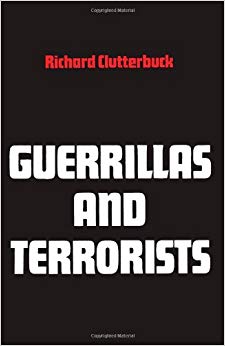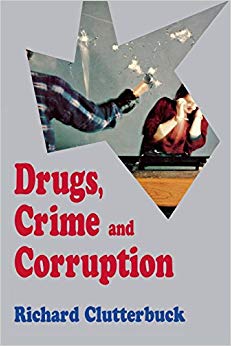Background
Richard Lewis Clutterbuck was born on 22 November 1917, at 30 West Park, Eltham, London, United Kingdom; the son of Major Lewis St John Rawlinson Clutterbuck.

The Old Schools, Trinity Ln, Cambridge CB2 1TN, UK
Cambridge University
Faringdon Rd, Shrivenham, Watchfield, Swindon SN6 8LA, UK
British Army Staff College
Senate House, Malet St, Bloomsbury, London WC1E 7HU, UK
University of London
Exeter EX4 4QL, UK
Exeter University
Belgrave Square, 37 Upper Belgrave St, Belgravia, London SW1X 8QB, UK
Royal College of Defence Studies









(Terrorism and guerrilla warfare, whether justified as res...)
Terrorism and guerrilla warfare, whether justified as resistance to oppression or condemned as disrupting the rule of law, are as old as civilization itself. The power of the terrorist, however, has been magnified by modern weapons, including television, which he has learned to exploit. To protect itself, society must understand the terrorist and what he is trying to do; thus Dr. Clutterbuck's purpose in writing this book: “to contribute to the understanding and cooperation between the police, the public and the media.” Terrorism and guerrilla warfare, whether justified as resistance to oppression or condemned as disrupting the rule of law, are as old as civilization itself. The power of the terrorist, however, has been magnified by modern weapons, including television, which he has learned to exploit. To protect itself, society must understand the terrorist and what he is trying to do; thus Dr. Clutterbuck's purpose in writing this book: “to contribute to the understanding and cooperation between the police, the public and the media.”
http://www.amazon.com/gp/product/0821405926/?tag=2022091-20
1977

(First published in 1990, this book will be of great inter...)
First published in 1990, this book will be of great interest to anyone concerned about conflict and stability in the 1990s, especially governments, police, and buisnesses involved in anti-terrorist technology. It will also be of value to students of politics who want to understand terrorism, and to people who want to take account of future technology in handling poltical and social problems.
http://www.amazon.com/gp/product/0415613590/?tag=2022091-20
1990

(Crimes generated by the drug world are rampant. A full ha...)
Crimes generated by the drug world are rampant. A full half of all murders in the United States are drug-related. Each year, 30,000 Columbians die violent deaths, victims of the drug trade. Fifty percent of all burglaries in Britain are committed by addicts to pay for their habit. And in the former Soviet Union and Eastern Europe, Mafia-style gangs are quickly learning how lucrative the drug trade can be.In an attempt to expose the links between crime, drugs, corruption, and terrorism throughout the world, expert Richard Clutterbuck here provides a profile of drug use world-wide. Drawing on the dramatic examples of Peru and Columbia as case studies, the book describes in detail the manufacture and distribution of cocaine, crack, heroin, cannabis, speed, ice, and LSD. Solutions exist, Clutterbuck argues, not in Latin America or Asia, but on the streets of the West. At a time when policies of suppression are faltering and when the War on Drugs has clearly failed, Clutterbuck weighs the pros and cons of the alternatives: What would need to be done to make suppression work? Should some drugs be decriminalized? How effective has the Dutch experiment been? Is the licensing of drugs to cure addictions an effective remedy?
http://www.amazon.com/gp/product/081471529X/?tag=2022091-20
1995
Richard Lewis Clutterbuck was born on 22 November 1917, at 30 West Park, Eltham, London, United Kingdom; the son of Major Lewis St John Rawlinson Clutterbuck.
Clutterbuck graduated from Cambridge University in 1939 with a master's degree specializing in mechanical sciences. After the war, he also attended the British Army Staff College and the Imperial Defense College.
In 1971, Clutterbuck earned his doctorate in politics from the University of London.
Clutterbuck followed a distinguished thirty-five-year military career with an equally distinguished career as a professor and author. He joined the Royal Engineers in 1937. During World War II he served in France, Sudan, Ethiopia, the Western Desert, and Italy. After the war, he commanded the 4th Field Squadron RE of the 7th Armoured Division in Germany in 1951, then he went back to the Staff College as an instructor. Clutterbuck’s counter-terrorism work in Trieste in 1945, and in Palestine in 1946-47, and Malaya in 1956-58 became the basis for his academic career and his first two books—Riot and Revolution in Singapore and Malaya 1945-1963 (1963) and The Long, Long War (1966). It also earned him the rank of major general and the Officer of the Order of the British Empire. He was Engineer-in-Chief of the British Army from 1968 to 1970. His expertise in the employing of terrorist tactics and guerrilla warfare permitted him to teach at American military colleges.
Clutterbuck retired from the military in 1972 and joined the staff of Exeter University, where he taught political conflict. He retired from Exeter University in 1983 but continued to teach on fellowships in Britain and the United States. His final book, Families, Drugs and Crime, was published posthumously in 1998.
Richard Clutterbuck was best known as a pioneer in the study of political violence. In his lifetime he was both a professional soldier and academic. His books include Protest and the Urban Guerilla (1973), Living with Terrorism (1975), Guerrillas and Terrorists (1977), Kidnap and Ransom (1978), Britain in Agony: The Growth of Political Violence (1978), Industrial Conflict and Democracy (1984), Kidnap, Hijack and Extortion (1987), Terrorism and Guerrilla Warfare (1990), International Crisis and Conflict (1993), Terrorism in an Unstable World (1994), and Drugs, Crime and Corruption (1995).
(First published in 1990, this book will be of great inter...)
1990(Terrorism and guerrilla warfare, whether justified as res...)
1977(Crimes generated by the drug world are rampant. A full ha...)
1995
